The Final Adios Addendum
Editor's Note: Our good friend Lorna Gail Dallin has written about her recent experience dealing with the death of a friend in Merida. The following account and the list of events, along with the original Final Adios article and it's attachment (linked at the end of this article) would be helpful to anyone having to deal with the death of a loved one here in Mexico. We suggest that you print this page and/or share it to your loved ones (by email or other means) who might be faced with this situation (there are handy buttons to help you do that just above this paragraph). We welcome your comments and experiences at the end of the article.
Preparing To Die
Three years ago, several of us gringa residents of Merida became curious about what happens when you die in Mexico, and in Merida in particular. Our curiosity turned to concern when we realized that since our “next of kin” does not live in Merida, they could have a rather bumpy time of it if they were unprepared for the eventuality of our death. While Cheryl, Martha and I gathered as much information as we could on what happens upon death, none of us had actually experienced this adventure with a family member or friend.
An Opportunity Presents Itself
Then, some weeks ago, my friend Fred Haight died here in Merida at his home, and presented me with an opportunity for direct experience. About a year before Fred’s demise, I had badgered him into getting his documents in order. This included an official translation of his birth certificate, and notarization and translation of his will. Grant and I had been named by Fred as executors of his estate and by extension, were the ones who would take care of things at his death.
In the following account, the “we” refers to myself, and Grant as co-executors and to either Eduardo or Hector who accompanied us at various times to act as a translator when needed. As Grant quoted to us at the start of this adventure, “Death is not an emergency”. Perhaps not, but that does not prevent the adrenaline from rising to meet this “most serious thing” as Blake named death. And death in a foreign country leaves certain requirements to be taken care of before the death is officially recognized and everyone can move on, including the deceased. Here is how it went for “we”.
The Chain Of Events
Wednesday:
- 1:30 PM: Fred dies at his home, attended by Hector, his friend and nurse through his recently escalating illness.
- Hector notifies Grant and myself and we meet at Fred’s apartment.
- Hector phones the doctor who has visited Fred twice at his home and is familiar with his condition. He will come to the house around 3:30 PM.
- Grant phones the U.S. Consulate to tell them of Fred’s death.
- Later in the afternoon, the doctor arrives and fills out the Certificado de Defuncion from the Secretaria de Salud.
- “We” then go to the Funeral Home (Perches Funeral Home on Calle 59) to make arrangements.
- Hector stays at the apartment with the body.
- The Funeral director looks at all documents and is satisfied that we can proceed with registration of death and getting the cremation permission. A date at the municipal crematorium is made by the Funeral Home, for 3:00 PM the next day, Thursday.
- We return to Fred’s home to await the arrival of the van which will take the body to the Funeral Home.
- We are to return to the Funeral Home at 9:30 PM to pick up an escort who will take us to the Registro Civil to start the process of obtaining permissions.
- At 9:30 PM we go to the Registro Civil (on Calle 65 between 64 y 66) with an attendant from the Funeral Home.
- Here we present our documents to the night duty official at the Intake Office.
- The official asks us to return the next day to speak with the Manager of the Intake Office as there is a slight irregularity with our paperwork.
Thursday:
- We (with escort from the Funeral Home) return to the Registro Civil, and when the Intake Manager is satisfied that all is in order we are taken to the person who will register the death.
- This person, at the Desk de Defuncion, inputs all information into the computer, into the records of the State of Yucatan and produces the documents which are presented at the crematorium giving permission to cremate Fred. There is also a permission given to be in possession of cremated remains.
- And finally, the official Death Certificate from the State of Yucatan is issued. At this time we learned it is a good idea to ask for at least three copies of the Death Certificate as you will need them in the days to come.
- The representative of the Funeral Home is with us through all encounters at the Registro Civil and will accompany us to the Municipal Crematorium.
- At the Municipal Crematorium there are more papers to sign and a payment to be made for the cremation.
- Fred’s body arrives at the Municipal Crematorium from the Funeral Home, just before the 3:00 PM appointment and the cremation takes place. We are asked to verify this by watching Fred’s body travel into the crematorium.
- We return to the Funeral Home later that night to make a final payment for their services and to pick up the ashes.
Several days later …
- Following up, we take Fred’s passport and Death Certificate to the U.S. Consulate and also fill out a form: “Personal Data Concerning Deceased” which the Consulate supplies.
- The Consulate issues a “Report of the death of an American Citizen Abroad” which confirms all Mexican documents and will be used to alert appropriate agencies in the U.S. This will be given to the family after all information and documents as described above have been given to the Consulate.
Suggestions and Observations
US aliens living here in Mexico will do everyone a big favor if we have our documents ready. The following documents should be easy to access, and should be translated and notarized in Mexico:
- Birth certificate
- Instruction to cremate – in which you express your desire to be cremated upon your death. This instruction should be a separate document and not included in any other instruction or will that has been left by the deceased.
- Simple will if there is property here to be distributed (somewhat optional).
If documents are not translated and notarized, enlist the help of the American Citizen Consulate Services right away. They may be able to expedite getting this done.
Note:Canadians … throw yourselves on the mercy of the Funeral Home who will know how to get most of this done. Documents will still have to be translated and notarized. It is unclear how much the Honorary Consul in Cancun may be able to assist Canadians.
If there is no request to cremate from the deceased, a spouse, relative or guardian gives the okay.
Do not take extraneous documents with you. Unless they are asked for, they will only be confusing. For example, there is no need to take the fideicomiso, driver’s license, or recent telephone or CFE bill.
Regarding the Apostille or lack thereof... This hung us up for a short while until we (and the U.S. Consulate) explained that an apostille is given only by the agency that issued the original document. In our case, the Registrar Civil wanted an apostillado for Fred’s Birth Certificate. But how would we get that, we asked, since it would have to be requested by Fred at the actual Registry of Births Office in the state of New York. And why, we asked, was this needed on the Birth Certificate of a dead man. “They” finally relented and passed us without the apostille. So, to have or to have not … an apostille, if you can get it, should probably be got. Canada, by the way, does not issue apostilles (see “The Final Adios” pamphlet on death in Mexico).
From the time the Funeral Home picks up the deceased until the cremation, they are your companions through the process. At least that was our experience with Perches Funeral Home. The Funeral Home rep who will accompany you knows where to go to get things done. You won’t necessarily have to worry about what to do next. You will be guided. Don’t be alarmed by the lack of formality at the Funeral Home... TIM (This is Mexico).
And finally, take your time at the Funeral Home and then at the Registro Civil. This is the time to remember that death is not an emergency … so don’t go rushing in like a norteamericano. Remember... TIM. Establish who you are in relation to the deceased and those who are with you. This will give everyone a chance to assess the situation. Calmly present your documents; they see hundreds of Mexican documents daily – but few from extranjeros with translations and strange attachments. Be prepared to wait, to go slowly, to have to explain things to various and sometimes many different sets of officials. Everyone grinds through this process to the other side, so will you.
And lastly, remember, … No hay reglas fijas.(There are no fixed laws or procedures) This was our experience. Yours could be different.
*****
For your reference, the original Final Adios article is here.




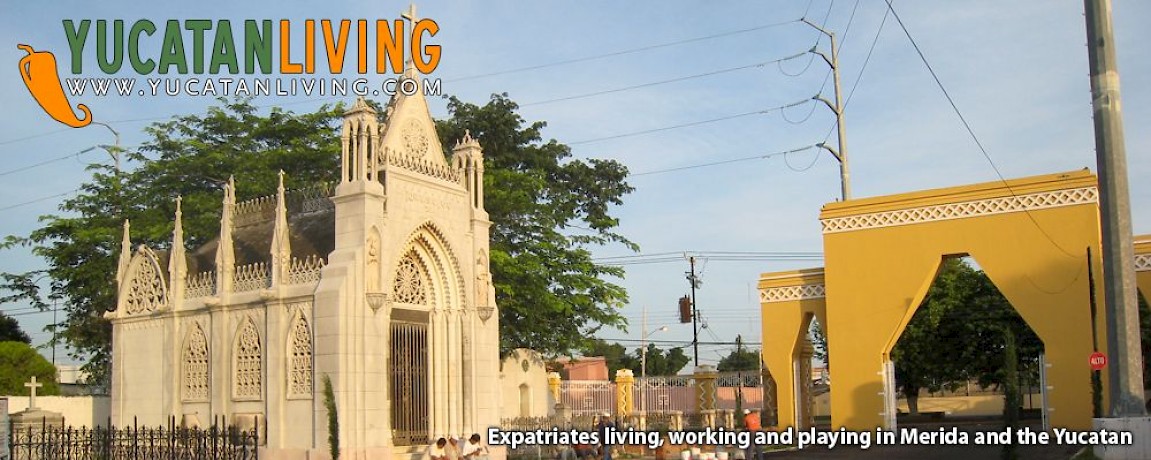


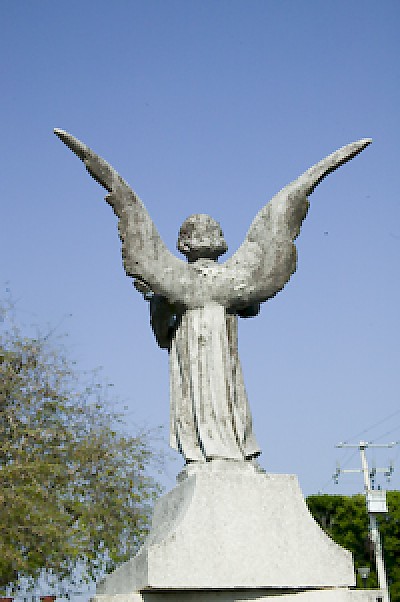
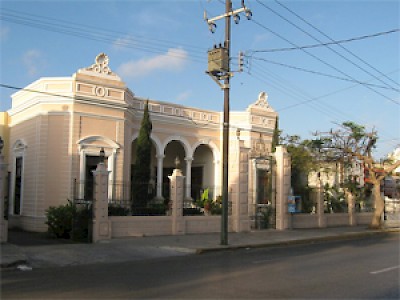
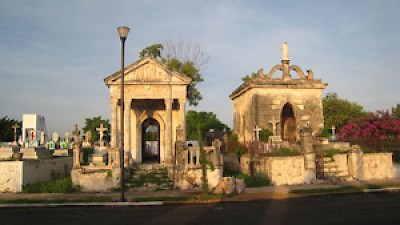
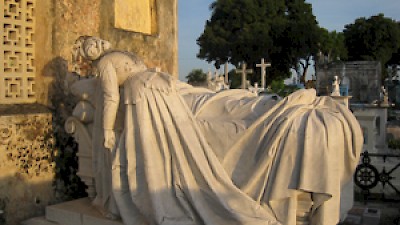
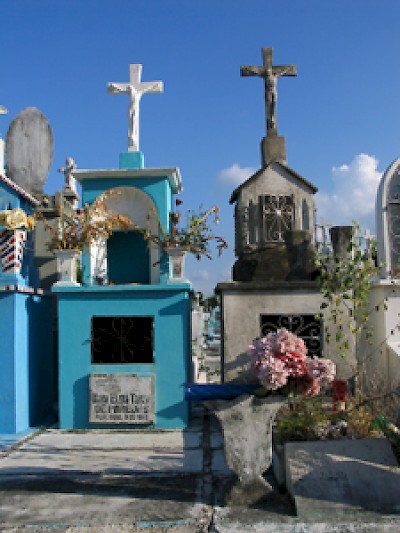

Comments
Evonne von Boeck 11 years ago
I'd like more info on the "Burial" association in San Miguel, I know there are quite a few of us who plan on being here in Merida 'til there's nothing left but ashes. Thank you for all the helpful information Lorna Gail.
Reply
Carol Wheeler 12 years ago
How lucky we are in San Miguel to have the 24-hour association, which (if you join) will take care of it all. Safety in numbers, I guess.
Reply
sara 15 years ago
Good article. I had a similar experience at the death of my spouse in 2005 in the village of Chacsinkin. The American Consulate was contacted first and handled many details for me, such as contacting the funeral home to come to the village (about 180 km from Merida) and providing me with several copies of the death certificate. These were needed when taking care of business in the States. As mentioned above, the funeral home agent stayed with me for the whole process of visiting at least four government agencies. My friend from the village stayed with me until I went to the airport to fly home. A very sorrowful experience was eased by the kindness and compassion of many people of the Yucatan.
Reply
bookworm 15 years ago
How about British expats? Does anyone know what they would have to do?
Great article! Thanks!
Reply
Lorna-Gail 15 years ago
The Municiple Crematorium is in the main Merida Cemetary ... one entrance is off Calle 81. We were directed there by the agent from the Funeral Home.
As for the cost of the bare bones funeral arrangements for Fred, I know the cremation was a little over 3 thousand pesos. The Funeral Home charges were about 5 thousand. That includes a container for the ashes. I will confirm this with Grant who was handling the pesos through this process.
Reply
Lorna-Gail 15 years ago
In response to Bruce's questions about prepaying a funeral, I have no information on that although I am sure a Funeral Home would be able to accommodate that request. We were recommending that there be a "stash of cash" on hand in the home to meet end of life expenses. Of course you would have to tell someone where that stash is!
As for burial in Mexico. It is not anything like what burial arrangements are made in U.S. or Canada. You "rent" a space to put your body for a specified number of years. Then remains are disinterred and put in a smaller container in the walls of the cemetery. Embalming in Mexico is a pale imitation of procedures in U.S. or Canada.
Cremation is the way to go unless for some reason it is against your principles.
I don't think that anyone asks permissions to distribute cremains, say out on the gulf.
Be discrete and you should be able to do this.
Reply
Mike 15 years ago
Thank you for the excellent information. Can someone tell me what procedure there would be if the deceased is here on a tourist visa.
Reply
Roy Melchior 15 years ago
When we helped with a friend's passing in Chuburna Puerto, the funeral home in Progresso was very helpfull. Here cash was required to expedite the process. Credit cards were not accepted. It was at 3 A.M. on a weekend when ATMs only dispense limited funds. Be prepared for informality and it might be usefull to ascertain what method of payment is required.
Reply
mcm 15 years ago
Thanks for a clear and concise report (and RIP Fred).
My experience with the death of my mother was similar, but differed in a few details (we also used Funeraria Perches):
1) We did not need a copy of the birth certificate -- the Registro Civil was satisfied with her passport and the doctor's death report.
2) We did not need to go in person to the crematorium (some may wish to do this), and the only payment made was to Perches who included payment for the cremation fees in their charge, and about 50 pesos to the Registro Civil for the death certificate.
3) If you plan to carry the ashes to the US, I was told by Funeraria Perches that the funeral home will submit some paperwork to the US Consulate a few days before the scheduled departure, and the US conslulate will provide you with some sort of paperwork that presumably keeps you out of the clutches of Homeland Security (I haven't actually gotten around to doing this yet...it's only been two years....).
Since I haven't done this, I'm not positive it's really necessary, nor what citizens of other countries (than the U.S.) would need to do, if anything.
Reply
Jan 15 years ago
Thanks, Lorna Gail, for the clear and concise step-by-step information. Where is the municipal crematorium? And, too, it would be good to know about costs. Sure appreciate you!
Reply
LeAnn Roberts 15 years ago
I went through the final illness, death and cremation of my husband here in Merida two years ago. I used Funeraria Uevedo on the recommendation of the palative care doctor. They were used to handling foreign documents and did all of the "legwork". My husband's son and a friend of mine went to the funeral home with the documents...it took them approximately two hours. Everything from that point on was handled by the funeral home. My husband's ashes were delivered to me less than 24 hours after his death.
Reply
(0 to 11 comments)Next »